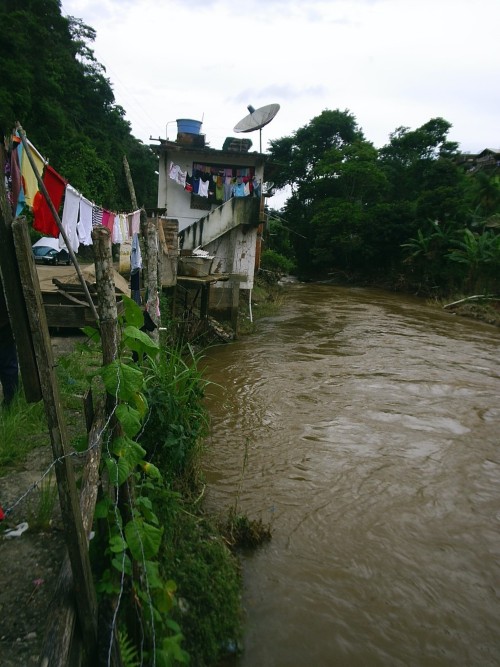
Failing the urban poor
Dr Deljana Iossifova, Senior Lecturer in Urban Studies, The University of Manchester, UK and Senior Professor Norma Valencio, Federal University of São Carlos, Brazil, discuss the life-threatening limitations of accessing sanitised water and how Manchester is working to help.
Some content on this page is available in Portuguese and English. Choose your language below.
In Brazil, as everywhere, water is a cross-cutting challenge. The development of water and sanitation infrastructure didn’t keep pace with the accelerated rate of urbanisation (45% in 1960 versus 85% in 2010).
Brazil’s informal urban settlements – favela and cortiço communities – have to rely on poor water and sanitation infrastructure. Although more than 80% of the country’s population are said to be connected to the urban water network, up to 10% source their water from springs, wells or rainwater storage. A common alternative at the fringes of the city is to dig a well close to a sewer pit, risking contamination and the transmission of waterborne diseases.

How our research is helping
Funded by the Royal Society, our project Towards Sustainable Sanitation in India and Brazil studies the intersections and interdependencies of water infrastructure with other infrastructures, as well as social, economic and environmental resources and how they're managed. For instance, we look at the interactions of sanitation infrastructure with water, energy or transport in order to understand how disruptions to one may lead to (sometimes unexpected) changes in the other.
We also explore interdependencies with political, social, technical and ecological systems. For instance, we trace changing power relations in the processes of negotiating, making and implementing infrastructure-related policies. Our research is decisively transdisciplinary, involving relevant stakeholders in government and business through collaborative workshops and consultations.
The project aims to identify how water and sanitation systems can be chosen, planned, designed, implemented, maintained and used in ways that minimise the negative outcomes of human activity and improve human health and wellbeing in the short and long term.
Public health emergencies and urban infrastructure
How well fragmented cities and densely populated urban settlements respond to public health emergencies depends on the well-managed provision of water and sanitation, among other infrastructure and services.
The project aims to identify how water and sanitation systems can be chosen, planned, designed, implemented, maintained and used in ways that minimise the negative outcomes of human activity and improve human health and wellbeing.
Dr Deljana Iossifova / Senior Lecturer in Urban Studies, The University of Manchester
Policies addressing the issue of fragmented provision among different sectors of the population haven’t led to much improvement to date.
A new Legal Framework for Basic Sanitation was sanctioned by the President of the Republic in 2020 with the target of ensuring universal access to water and a waste-water and sewage treatment rate of 90% by the year 2033.
Our research is designed to feed into relevant decision-making processes so that this goal can be delivered in ways that are socially just and environmentally sustainable.
-
Dr Deljana Iossifova
Senior Lecturer in Urban Studies, School of Environment, Education and Development, The University of Manchester
View Dr Deljana Iossifova's research profile
-
Senior Professor Norma Valencio
Federal University of São Carlos, Brazil
View Senior Professor Norma Valencio's research profile


